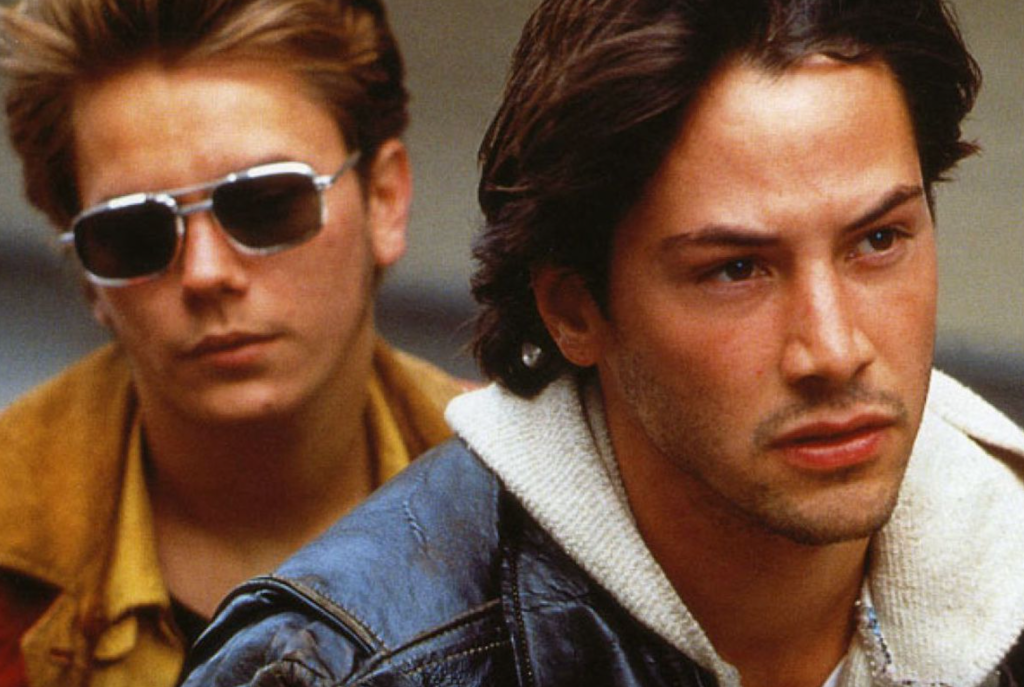When Mike (River Phoenix) gets anxious or overwhelmed, his hands start to twitch and his eyelids dreamily flutter. Then he’s on the ground, passed out cold. The young protagonist of Gus Van Sant’s My Own Private Idaho (1991) has a bad case of narcolepsy, the sleeping disorder that forces its sufferer to nod off whether they’d like to or not. It is, to say the least, an inconvenience. But it’s especially so for someone like Mike.
In his early 20s, Mike has, for the last few years, been working as a street hustler in the Pacific Northwest. His clients are mainly crusty older men who sometimes have strange fetishes, like the john who has him clean his apartment while dressed like a Dutch baby. His best friend is Scott (Keanu Reeves), the cloistered son of Portland’s hoity-toity governor who has sex with men only for money and the rush of rebellion. His quasi-father figure is a loud-mouthed older guy with delusions of grandeur named Bob (William Richert) who notionally oversees an abandoned building in which Mike and several other young men in his profession live.
Only human, Mike longs the most for things he can’t have. One is his long-lost mother, about whom he dreams regularly, who is said to live in Idaho, and who is responsible for a makeshift road trip that the movie will chronicle soon after it begins. The other is Scott, whom Mike is in love with. Set around a campfire lighting up the night’s darkness, the movie’s most heartrending scene — which Phoenix himself revised from three relatively ambiguous pages to an emotionally bald eight — Mike confesses his love (“I really want to kiss you, man”) for a guy firm in his belief that two men are not built to love each other.
It’s easy to want more scenes like this one in My Own Private Idaho — ones that engage the emotionality inherent in the story and best capture the soulful sensitivity of Phoenix’s poignant performance. But this is a movie that can feel undermined by its writer and director, who continues the street-life focus of his previous two movies, Mala Noche (1985) and Drugstore Cowboy (1989), and who had originally envisioned Mike being practically asexual, a cipher. Van Sant is prone to great-to-look-at overstylization — inspired blinks of fast motion, a funny scene imagining the cover models of gay nudie magazines in vaguely competitive conversation — and an absurdist sense of humor that undercuts the resonance not just in Mike’s story but in the lives he and his fellow young hustlers live. With its focus on young runaways getting by in the Northwest, My Own Private Idaho can feel like a dramatic cousin to Martin Bell’s 1984 documentary Streetwise, only romanticized enough to avoid even a whisper about AIDS.
Van Sant’s insistent cribbing from classic Shakespearean texts strikes you more like distracting experimentalism in a movie that could benefit from playing things a little straighter, no pun intended. My Own Private Idaho is at its finest when it’s not joking around — when it’s most pointedly leaning into the heartbreaking truth that this is a movie about ever-present, romantic-or-otherwise love gone devastatingly unrequited: Mike and Scott, Mike and his mother, Bob and Scott, Mike and a German client (Udo Kier) who memorably serenades the young man he so badly wants with the help of a table lamp. All Mike has to his name is his desires — the optimism that something better awaits him somewhere down the road. Phoenix gives the movie a potent melancholy it would otherwise not have. My Own Private Idaho was lucky to have an actor who would not be long for this world.
